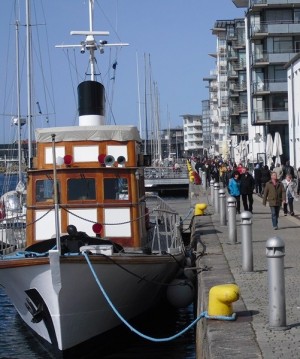The Red, And Blue, Of Seaside Helsingborg
We headed to Max, a Swedish hamburger chain founded up north in Gällivare in 1968. Though inexpensive (at least by Swedish standards, although a combo meal with a burger, fries, and a soft drink can cost more than 65 kronor, or roughly $10), the quality was surprising: fully cooked — and looking nothing like similarly priced American fare such as McDonald’s — there was actually meat in my bacon cheeseburger. I was stunned. Though I’d sworn off fast food some years prior, I decided this didn’t exactly count as breaking my pledge.
Our bellies full and our energy reserves running high (though some of that, undoubtedly, was due to the natural anticipation of kickoff drawing nearer), we again trekked up a hill down Helsingborg’s fairly narrow streets to Olympia. The stadium, one of the largest in Sweden, first opened in July 1898, but was rebuilt in 1993 and 1997. It was plain, sure, but featured everything a football stadium should have: comfortable stands, decent shading, a perfectly groomed pitch, and adequate facilities (still, admittedly, I did find it a shock to discover someone had placed a supporters scarf from HIF’s opponent, IF Elfsborg, in such a position within the urinal that avoiding it was impossible). Rowdy as I was told Olympia could get, it seemed unlikely given the surrounding residential burg of nondescript two and three-story flats around the low-set stadium that would offer little protection if it rained.
Then the drums came. Sudden, booming, they reverberated throughout the bowl-shaped stadium and back into the sea air, wafting about in a thunderous loop. Chants soon followed, and suddenly, I saw an explosion.
As any good journalist would do, I whipped out my camera and started taking photos. What was happening? Was this a riot? There were more explosions, followed by throngs of people waving banners and marching in unison.
These were HIF’s main supporters, Martin told me, the Kärnan. They were entering the stadium with their usual ostentatious show of force, and we were standing right in their section.
Within minutes, we were surrounded.
A sea of red and blue flags surrounded us, flapping through the air seemingly held aloft by the roar of the 17,000-plus in attendance. The insanity was all around us, and there was no way out.
And in the middle of it all was The Ass. His voice rose above the others, leading us on, setting a tone which the entire stadium mimicked. He seemed crazy, deranged, a horrible caricature of the leader of a mob and all that is morally reprehensible about humanity. The fact that he seemed fairly sober was all the more unnerving.
But I loved him. He whipped the crowd into frenzy with masterful execution, and for every vulgar chant he started, I found myself joining in. When the fired-up masses began to make fun of the city (Borås) that Elfsborg was from, I participated with just as much fervor.
The Ass and his mob had taken hold of me, and wouldn’t let me go. And I wouldn’t have had it any other way.
The entire stadium seemed to vibrate with the ebb and flow of the game as if it were its own living, breathing creature. For the whole 90 minutes, the deafening roar never let up. Like waves pounding against the coast, the sound crashed against me time and time again. Though I could feel my throat tearing as I screamed at the top of my lungs, I couldn’t even hear myself.
It was official: I had lost all emotional control. Shameful as it is to say, if the frenzied mob had decided to storm out and set the entire city ablaze, I probably would have joined in.
Somewhere in the midst of all this decidedly unwholesome frivolity bordering on violent flashpoint was a football match, but in the heat of the moment the fact escaped me. While I managed to join in the celebration when Helsingborg scored to start the second half, and joyously jeered when Elfsborg missed a potential equalizing penalty shot late, these actions were more or less involuntary, stemming from a severe case of mob-induced sports psychosis.
Strangely, the match concluded with little disruption. The roar gradually died down, and the cheery supporters slowly made their exit — not in one massed army, but in small groups of twos and threes. To my surprise, no dumpsters were overturned, no bricks were hurled through windows, and no cars were set on fire.
Gradually my mental state began to return to normal. I turned to Martin.
“Was that the craziest match ever, or what?” I asked.
“Actually, it’s usually a lot louder,” he told me in a precise British accent so perfect that it took me a moment to remember he wasn’t actually a Brit. “Most of the time we’re much more enthusiastic.”
Lord knows what would have happened to me if it had been one of those other times.


